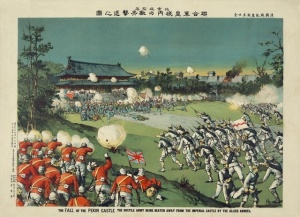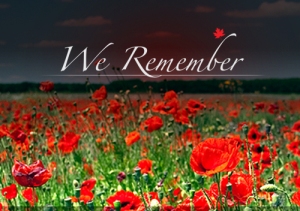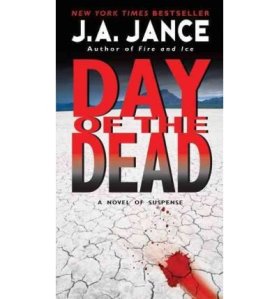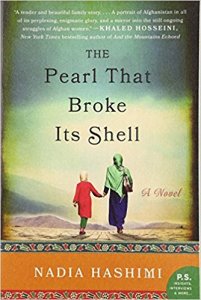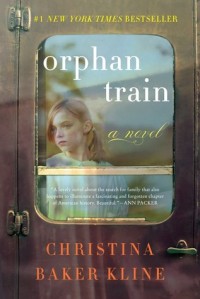
Book Review: Orphan Train by Christina Baker Kline
This was one of those weekends when the sun poured in the bedroom window, providing enough light and warmth, on a pair of particularly cool and breezy days, to make stretching out on the bed and relaxing, surrounded by two dogs and a cat, the perfect way to spend some off time.
I normally don’t take time off. My mother was one of those “idle hands are the devil’s playground” types of people, though she never worded her opinion like that. It went more like: “Don’t you have anything better to do?” So usually I feel tremendous guilt when I just sit and read. My Hawaiian-born husband is always reminding me that I’m nuts and need to chill. So I’m working on it. This weekend I did what he would have liked to do.
I actually don’t remember where or when I got this book—though it did have a Costco price tag on it, so maybe there—but when I finally finished the last novel, which I’ve yet to write about, I was feeling in a certain kind of mood: real world but soul touching. So I scanned the many many many tomes on our shelves and this one jumped out at me. Wow, what a good choice it turned out to be.

This is the story of an orphan train, a piece of history about which I and the author ( until she wrote this book) had absolutely no knowledge. It is also the story of two people, one very elderly lady who lived through the orphan train personally, and a seventeen-year-old First Nations foster girl, who is struggling to survive the Foster Child world and its nightmares. It bounces back and forth in time from the 1920s and ’30s in the Midwest of America, to 2011 in Maine.
Most is written in the present tense, and part in first person. It took me a little while to get used to the feel of present tense with the 2011 story. It seemed to settle better into place with the 1920s tale which was recounted in first person. But once I finished the book, I realized it was the best way to tell the story. It made it so much more deep and heart-wrenching than a distant and more observational voice might have. In first person and present tense, we feel the pain of the main characters deep in our own hearts and can really relate to all their troubles and the obstacles to their survival.
Although it’s a hard plot to wade through because of the story itself, there are tremendously uplifting sections as well. It makes one remember that even in the most horrific times, people come through and change lives for the better, even when we are sure there isn’t a chance for anything good to come out of what so far has been a series of tough situations. I felt the modern tale of Molly, the girl in foster care, was right on the money, having been indirectly involved in the foster care system and it’s potential insanities a few years ago. I saw what can happen when so-called foster parents take on many children, essentially just for the money this choice can provide, and the damage both short and long term that this can do to the children. And the 1920s tale was consistent with stories my mother and dad had related of their growing up in that time.
I would definitely describe the book as a five-star ***** read. It’s absolutely wonderful, soul moving, and drives you forward, wanting more. I highly recommend it.
The book is available darn near everywhere, especially on amazon.

From the Back Cover
Between 1854 and 1929, so-called orphan trains ran regularly from the cities of the East Coast to the farmlands of the Midwest, carrying thousands of abandoned children whose fates would be determined by pure luck. Would they be adopted by a kind and loving family, or would they face a childhood and adolescence of hard labor and servitude?
As a young Irish immigrant, Vivian Daly was one such child, sent by rail from New York City to an uncertain future a world away. Returning east later in life, Vivian leads a quiet, peaceful existence on the coast of Maine, the memories of her upbringing rendered a hazy blur. But in her attic, hidden in trunks, are vestiges of a turbulent past.
Seventeen-year-old Molly Ayer knows that a community-service position helping an elderly widow clean out her attic is the only thing keeping her out of juvenile hall. But as Molly helps Vivian sort through her keepsakes and possessions, she discovers that she and Vivian aren’t as different as they appear. A Penobscot Indian who has spent her youth in and out of foster homes, Molly is also an outsider being raised by strangers, and she, too, has unanswered questions about the past.
Moving between contemporary Maine and Depression-era Minnesota, Orphan Train is a powerful tale of upheaval and resilience, second chances, and unexpected friendship.

The #1 New York Times Bestseller. From Amazon.ca
Christina Baker Kline’s Orphan Train is an unforgettable story of friendship and second chances that highlights a little-known but historically significant movement in America’s past—and it includes a special PS section for book clubs featuring insights, interviews, and more.
Penobscot Indian Molly Ayer is close to “aging out” out of the foster care system. A community service position helping an elderly woman clean out her home is the only thing keeping Molly out of juvie and worse…
As she helps Vivian sort through her possessions and memories, Molly learns that she and Vivian aren’t as different as they seem to be. A young Irish immigrant orphaned in New York City, Vivian was put on a train to the Midwest with hundreds of other children whose destinies would be determined by luck and chance.
Molly discovers that she has the power to help Vivian find answers to mysteries that have haunted her for her entire life—answers that will ultimately free them both.
Rich in detail and epic in scope, Orphan Train is a powerful novel of upheaval and resilience, of unexpected friendship, and of the secrets we carry that keep us from finding out who we are.

About The Author from her website: http://christinabakerkline.com/bio/
A #1 New York Times bestselling author of seven novels, Christina Baker Kline is published in 40 countries. Her latest novel, A Piece of the World, explores the real-life relationship between the artist Andrew Wyeth and the subject of his masterpiece Christina’s World. An instant New York Times bestseller, A Piece of the World was awarded the 2018 New England Prize for Fiction and the Maine Literary Award, among other prizes. Kline’s 2013 novel Orphan Train, about a little-known but significant piece of American history, spent more than two years on the NYT bestseller list. Hundreds of communities, schools, and universities have chosen it as a “One Book, One Read” selection. Both novels have been optioned for film. Kline has written five other novels — Orphan Train Girl, The Way Life Should Be, Sweet Water, Bird in Hand, and Desire Lines. A resident of New York City and Southwest Harbor, Maine, Kline serves on the NYC Center for Fiction, the Bar Harbor Jesup Library, and the Roots & Wings (NJ) advisory boards and on the gala committees of the Authors Guild and Friends of Acadia. Her new novel, about Australia’s complicated convict history, will be published in 2020.
In addition to her novels, Kline has commissioned and edited two widely praised collections of original essays on the first year of parenthood and raising young children, Child of Mine and Room to Grow, and edited a book on grieving, Always Too Soon. She is coeditor, with Anne Burt, of a collection of personal essays called About Face: Women Write About What They See When They Look in the Mirror, and is co-author, with her mother, Christina Looper Baker, of a book on feminist mothers and daughters, The Conversation Begins. Her essays, articles, and reviews have appeared in The New York Times, the San Francisco Chronicle, Money, More, Salon, and Psychology Today, among other places.
Kline was born in Cambridge, England, and raised there as well as in the American South and Maine. She is a graduate of Yale, Cambridge, and the University of Virginia, where she was a Henry Hoyns Fellow in Fiction Writing. She has taught fiction and nonfiction writing, poetry, English literature, literary theory, and women’s studies at Yale, NYU, and the University of Virginia, and served as Writer-in-Residence at Fordham University for four years. She is a recipient of several Geraldine R. Dodge Foundation Fellowships and Writer-in-Residence Fellowships at the Virginia Center for the Creative Arts. She is on the advisory board of Roots & Wings, a foster-care organization in NJ; The Criterion Theatre in Bar Harbor, ME; the Montclair Literary Festival in Montclair, NJ; the Jesup Library Honorary Campaign Committee in Bar Harbor, ME; and the Montclair Animal Shelter, and supports a number of libraries and other associations.
Kline lives in New York City with her husband, David Kline. They are the parents of three sons, Hayden, Will, and Eli. Kline spends as much time as possible in Southwest Harbor, Maine.
Links for more info on the orphan trains:
Orphan Trains
Welcome!
https://www.pbs.org/video/ozarkswatch-video-magazine-the-orphan-train/
http://www.encyclopediaofarkansas.net/encyclopedia/entry-detail.aspx?entryID=2400




